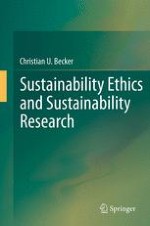2012 | OriginalPaper | Buchkapitel
3. The Inherent Ethical Dimension of Sustainability – Toward a Relational Ethical Perspective
verfasst von : Christian U. Becker
Erschienen in: Sustainability Ethics and Sustainability Research
Verlag: Springer Netherlands
Aktivieren Sie unsere intelligente Suche, um passende Fachinhalte oder Patente zu finden.
Wählen Sie Textabschnitte aus um mit Künstlicher Intelligenz passenden Patente zu finden. powered by
Markieren Sie Textabschnitte, um KI-gestützt weitere passende Inhalte zu finden. powered by
